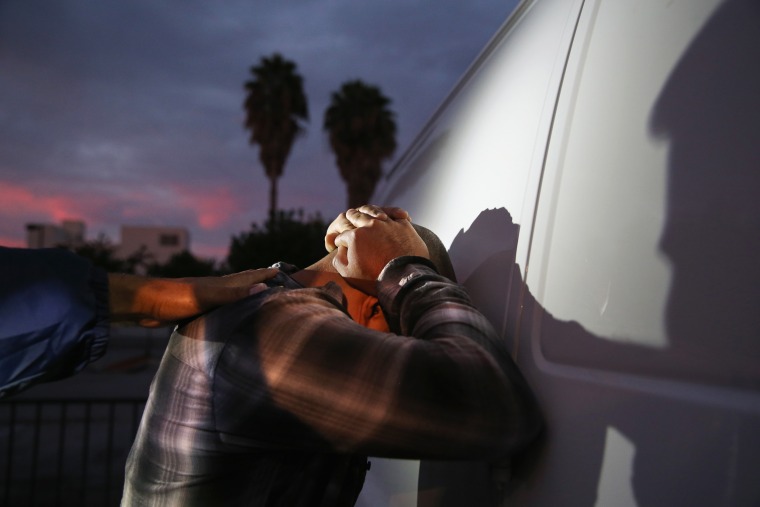Law enforcement's methods for establishing "gang affiliation” to crack down on alleged MS-13 gang members have exacerbated the arrest, detention and deportation of young immigrants in New York regardless of proven criminal activity, a newly published report shows.
The report “Swept up in the Sweep: The Impact of Gang Allegations on Immigrant New Yorkers,” authored by the New York Immigration Coalition and the Immigrant and Non-Citizen Rights Clinic at the CUNY School of Law, details ways in which law enforcement uses what experts call “arbitrary methods” to profile immigrant youth of color by establishing gang affiliation.
When this kind of affiliation is alleged, law enforcement then has the authority to add individuals to gang databases — an action that could eventually hurt their immigration status.
"It’s not a crime to be a gang member,” said Babe Howell, a professor at the CUNY School of Law, during a press phone call on Wednesday. “What we’re seeing is an addiction to policing based on profiling and stereotyping people, instead of focusing on evidence — on people that have actually done something [criminal].”
The report was released on the same day President Donald Trump said that MS-13 gang members "are animals” during a roundtable on sanctuary cities.
Howell, who has studied gang policing practices for years, found that the New York Police Department and the Nassau County Police include people in gang databases based on evidence such as what kind of apparel they wear, certain types of graffitis, tattoos and being seen near gang-related locations, among other criteria.
“A lot of these locations are community spaces like parks, bodegas,” said Howell. “Is not possible to exist in a community of color and not be photographed in these locations.”
Whether there’s any proven criminal activity or not, being listed in gang databases hurts these immigrants' chances of getting legal permanent residency.
“They use this information in court, and the fact of the arrest, to deny people bonds. Then, they have to fight their cases from the detention center,” said Emily Torstveit Ngara from Hofstra University during the press call.
Moreover, having such broad criteria hinders law enforcement's ability to more accurately monitor gang activity, experts said.
“They track so many people that they lose the serious threat in the mass of useless data,” said Nermeen Arastu from the Creating Law Enforcement Accountability & Responsibility Project at CUNY School of Law. “If they focus on the criminality without marking entire demographics, they will be more effective.”
Gang databases tend to not be publicly shared, meaning that people are often unaware that they have been listed. According to the report, no mechanism exists to challenge such inclusion.
“These are not targeted policies. They’re casting a wide net so that’s why they’re carrying out anti-immigrant policies," said Camille Mackler, from the New York Immigration Coalition, an immigrant advocacy group.
In New York, mainly in Long Island, gang policing has been taking place near sensitive locations such as schools — especially those with school resource officers, known as SRO’s. SRO's are law enforcement officers employed by a police department or law enforcement agency to work in collaboration with schools.
“One-third of survey respondents report that they had noticed a change since 2017 with how SROs interacted with students from immigrant backgrounds,” the report reads. “The role of SROs in these incidents is particularly concerning given that they are uniformed police personnel.”
Immigrant youth detentions in New York have increased dramatically since Trump spotlighted gang violence and MS-13 during his campaign and throughout his first year in office. MS-13 is an international criminal gang that originated in Los Angeles in the 80’s, started mainly by Salvadorans in the U.S.
At least 821 immigrants under the age of 18 currently are detained in New York, according to data from Transactional Records Access Clearinghouse (TRAC). In 2017, 238 young immigrants were detained by immigration authorities — compared to just 31 in 2016.
From 2016 through this past March, there has been an increase of young immigrants opting to voluntarily leave the U.S. instead of waiting for an immigration court hearing, as well as more immigrants under 18 who received final deportation orders.
Similar spikes, in both youth detentions and deportations, have been reported nationwide.
The increases occurred at the same time that the U.S. Department of Homeland Security (DHS) and U.S. Department of Justice (DOJ) were conducting 'Operation Raging Bull' “to target and dismantle MS-13.” The operation culminated in the arrest of 267 people in all of the United States and overseas.
Authorities say these actions have made the nation safer.
“By taking criminal street gang members and associates off the streets — if they are here illegally, removing them from the country — we are addressing a significant security and safety vulnerability,” said Derek Benner, the acting director of Homeland Security Investigations, when he announced the outcomes of 'Operation Raging Bull' last year.
Other 2017 nationwide sweeps have led to the arrests of 1,300 people in large gang-enforcement operations led by Immigration and Customs and Enforcement (ICE) and DHS. "The goal at the end of day is to arrest, prosecute, imprison, and deport and remove transnational gang members as well as to suppress violence and prosecute criminal enterprises," Benner said in May of 2017 about the 1,300 arrests.
While immigration authorities see their gang policing methods as effective, immigration advocates and experts fear they are hurting the most vulnerable: immigrant youth.
“Anyone who’s undocumented, with criminal background or not, are at risk,” said Arastu. “These practices are exacerbating deportations because these allegations seriously hurt their [immigration] cases.”

